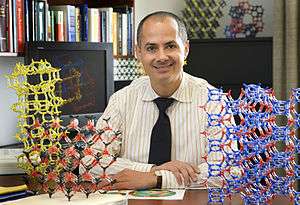Omar M. Yaghi
| Omar Mwannes Yaghi | |
|---|---|
 | |
| Native name | عمر مونّس ياغي |
| Born |
February 9, 1965 Amman, Jordan |
| Fields | Chemistry |
| Institutions | University of California, Berkeley |
| Alma mater | University at Albany, SUNY |
| Doctoral advisor | Prof. Walter G. Klemperer |
| Notable awards |
Solid State Chemistry Award (1998) Sacconi Medal (2004) Materials Research Society Medal (2007) Newcomb Cleveland Prize (2007) American Chemical Society Chemistry of Materials Award (2009) King Faisal International Prize (2015) Mustafa Prize (2015) TÜBA Academy Prize (2016) Spiers Memorial Award (2017) Albert Einstein World Award of Science (2017) |
|
Website yaghi | |
Omar M. Yaghi (Arabic: عمر مونّس ياغي, born February 9, 1965) is a Jordanian-American chemist, currently the James and Neeltje Tretter Chair Professor of Chemistry at the University of California, Berkeley. His most recognizable work is in the design and production of new classes of compounds known as metal-organic frameworks (MOFs),[1][2] zeolitic imidazolate frameworks (ZIFs), and covalent organic frameworks (COFs). MOFs are noted for their extremely high surface areas (5640 m2/g for MOF-177)[3] and very low crystalline densities (0.17 g·cm−3 for COF-108).[4] He has successfully developed these materials from basic science to applications in clean energy technologies including hydrogen and methane storage, and carbon dioxide capture and storage.
Biography
Yaghi was born in Amman, Jordan in 1965. At the age of 15, he moved to the United States at the encouragement of his father. Although he knew little English, he began classes at Hudson Valley Community College. He later transferred to the University at Albany, SUNY to finish his degree. He began his graduate studies at University of Illinois, Urbana-Champaign at the age of 20 and received his PhD in 1990 under the guidance of Prof. Walter G. Klemperer. He was a National Science Foundation Postdoctoral Fellow at Harvard University (1990–1992) with Professor Richard H. Holm. He was on the faculties of Arizona State University (1992–1998), the University of Michigan (1999–2006), and the University of California, Los Angeles (2007-2012).
In 2012, he moved to the University of California, Berkeley where he is now the James and Neeltje Tretter Professor of Chemistry. He is the Founding Director of the Berkeley Global Science Institute. He is also a Co-Director of the Kavli Energy NanoSciences Institute of the University of California, Berkeley and the Lawrence Berkeley National Laboratory, as well as the California Research Alliance by BASF. His early accomplishments in the design and synthesis of new materials have been honored by the Solid State Chemistry Award of the American Chemical Society and Exxon Co. (1998) and the Sacconi Medal of the Italian Chemical Society (2004). His work on hydrogen storage was recognized by Popular Science which listed him among the 'Brilliant 10' scientists and engineers in the United States in 2006,[5] and the US Department of Energy Hydrogen Program Award for outstanding contributions to hydrogen storage (2007). He was the sole recipient of the Materials Research Society Medal for pioneering work in the theory, design, synthesis and applications of metal-organic frameworks[6] and received the Newcomb Cleveland Prize of the American Association for the Advancement of Science for the best paper published in Science (2007).[7] He is the recipient of the American Chemical Society Chemistry of Materials Award (2009). He is the second most cited chemist in the world (2000–2010).[8] In 2015 he was awarded both the King Faisal International Prize in Chemistry[9] and the Mustafa Prize in Nanoscience and Nanotechnology[10]. In 2016 he was awarded TÜBA Academy Prize in Basic and Engineering Sciences for establishing Reticular Chemistry. [11][12] In 2017, Yaghi was awarded the Spiers Memorial Award from the Royal Society of Chemistry[13], the Medal of Excellence of the First Order bestowed by King Abdullah II[14], and the Albert Einstein World Award of Science conferred by the World Cultural Council.[15]
References
- ↑ K. Sanderson (2007). "Materials Chemistry: Space Invaders". Nature. 448 (7155): 746–8. Bibcode:2007Natur.448..746S. PMID 17700673. doi:10.1038/448746a.
- ↑ S.F. Robert (2008). "Framework Materials Grab CO2 and Researchers' Attention". Science. 319 (5865): 893. PMID 18276862. doi:10.1126/science.319.5865.893.
- ↑ A.G. Wong-Foy; A.J. Matzger; O.M. Yaghi (2006). "Exceptional H2 Saturation Uptake in Microporous Metal-Organic Frameworks". Journal of the American Chemical Society. 128 (11): 3494–5. PMID 16536503. doi:10.1021/ja058213h.
- ↑ H.M. El-Kaderi; J.R. Hunt; J.L. Mendoza-Cortés; A.P. Côté; R.E. Taylor; M. O'Keeffe; O.M. Yaghi (2007). "Designed Synthesis of 3D Covalent Organic Frameworks". Science. 316 (5822): 268–72. Bibcode:2007Sci...316..268E. PMID 17431178. doi:10.1126/science.1139915.
- ↑ "The Fifth Annual Brilliant 10". Popular Science. September 2006. Retrieved 2010-02-28.
- ↑ "MRS Medal: 2007 MRS Medal Award Recipient". Materials Research Society. Retrieved 2010-02-28.
- ↑ "AAAS Awards: Newcomb Cleveland Prize Recipients". American Association for the Advancement of Science. Retrieved 2010-02-28.
- ↑ Top 100 Chemists, 2000-2010. ScienceWatch.com. Thomson Reuters.
- ↑ "King Salman to Honour Winners of 37th Annual King Faisal International Prize". PR Newswire. February 25, 2015. Retrieved May 31, 2017.
- ↑ "Mustafa (PBUH) Prize awarded". Iran Daily. December 26, 2015. Retrieved May 31, 2017.
- ↑ Omar M. Yaghi's biography
- ↑ Sezer, Yusuf (November 16, 2016). "TÜBA 2016 Akademi Ödülleri’ni kazananlar açıklandı" (in Turkish). ABC Haber. Retrieved June 1, 2017.
- ↑ "Spiers Memorial Award 2017 Winner". Royal Society of Chemistry. Retrieved May 31, 2017.
- ↑ "King honors Jordanian chemist". Petra. May 16, 2017. Retrieved June 1, 2017.
- ↑ "2017 World Cultural Council Awards". EurekAlert!. May 30, 2017. Retrieved May 31, 2017.
External links
- Omar Yaghi’s global journey
- The beauty of molecules - an Interview with Omar Yaghi
- The Yaghi group website.